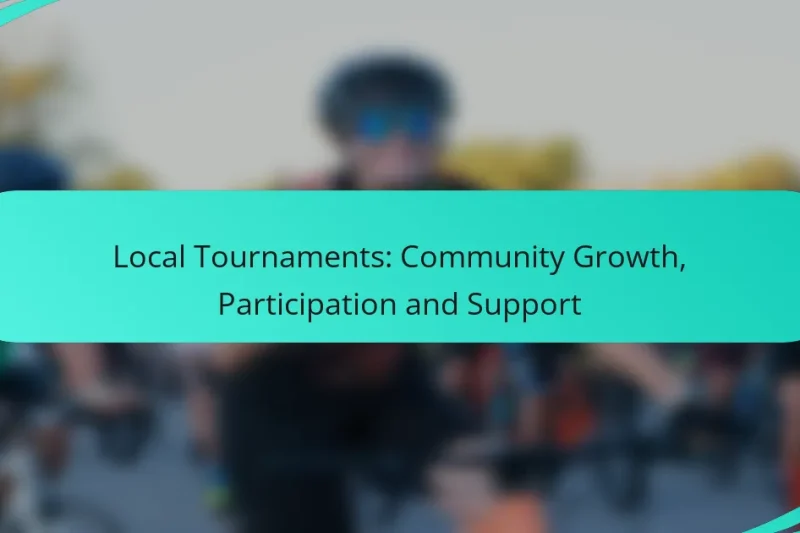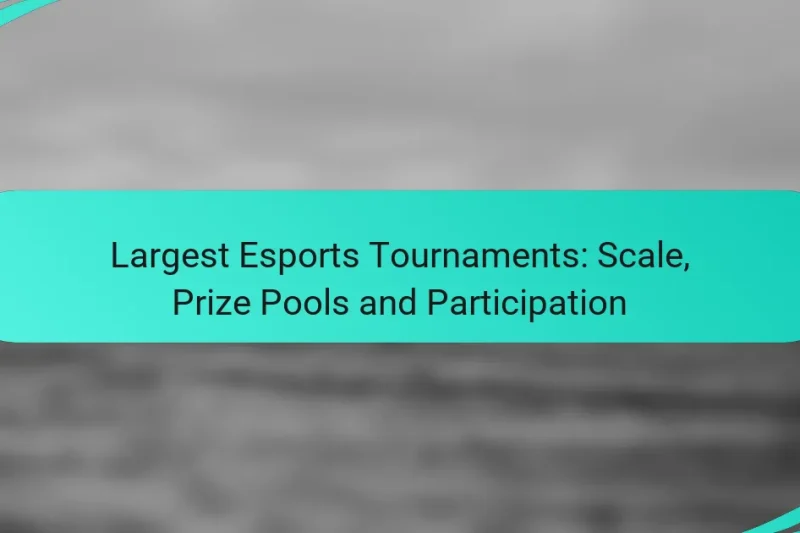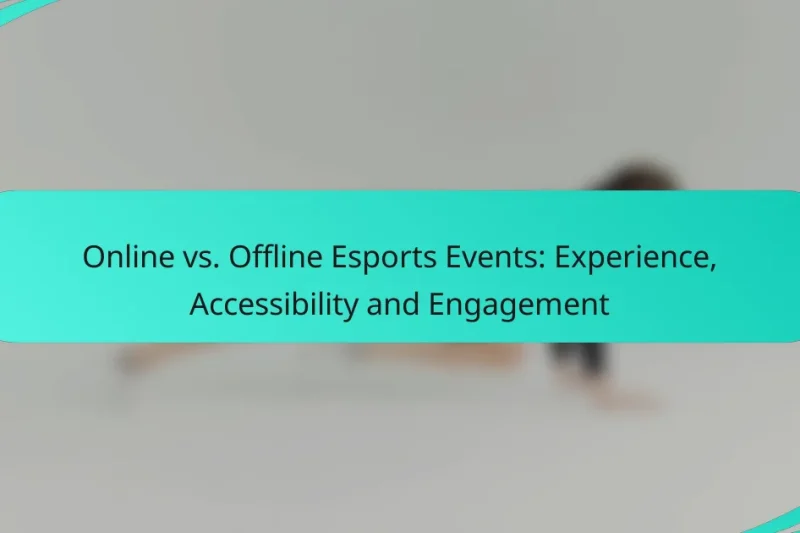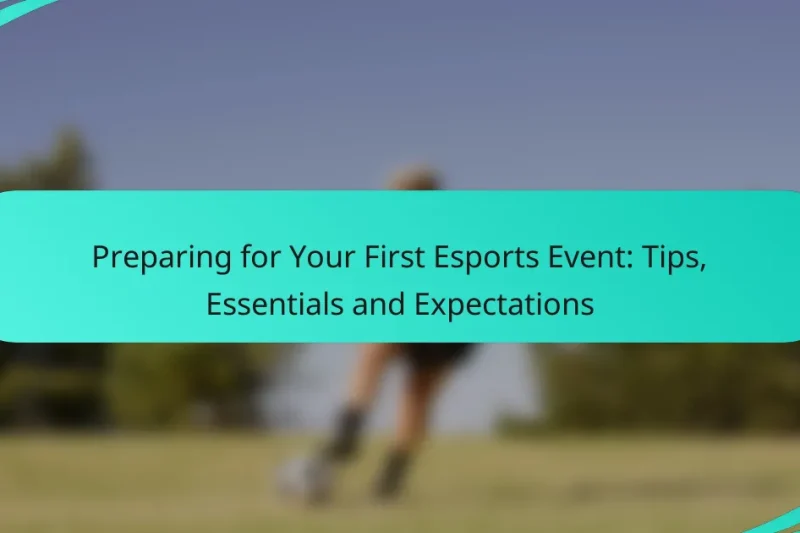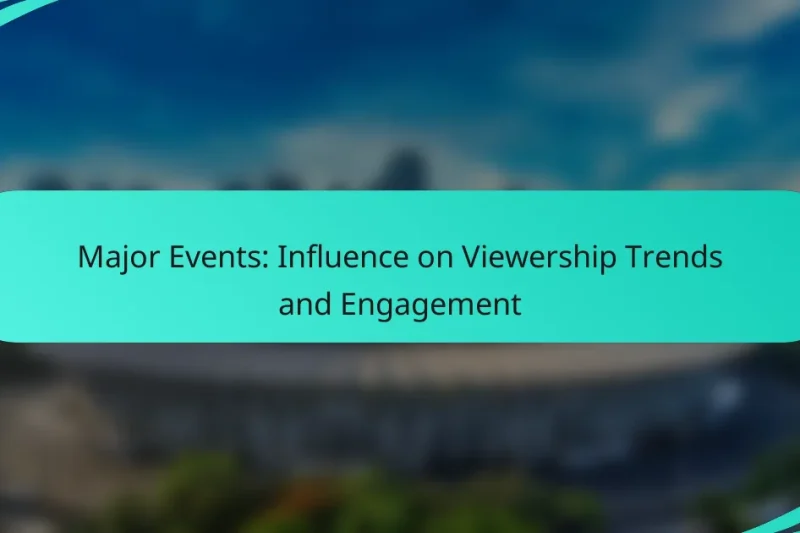Local tournaments serve as a vital catalyst for community growth by uniting individuals through shared interests … Local Tournaments: Community Growth, Participation and SupportRead more
Esports History and Player Profiles: Esports Tournaments and Events
Esports has evolved from humble beginnings to a global phenomenon, with tournaments attracting elite players and massive audiences. This rich history is marked by significant events that showcase diverse games and offer lucrative prize pools. Additionally, the profiles of top players highlight their remarkable skills and personal journeys, inspiring fans and future competitors alike.
Largest Esports Tournaments: Scale, Prize Pools and Participation
The largest esports tournaments in 2023 are monumental events that draw elite players and teams globally, … Largest Esports Tournaments: Scale, Prize Pools and ParticipationRead more
Online vs. Offline Esports Events: Experience, Accessibility and Engagement
The debate between online and offline esports events highlights key differences in experience, accessibility, and engagement. … Online vs. Offline Esports Events: Experience, Accessibility and EngagementRead more
Economic Impact: Hosting Esports Tournaments and Local Benefits
Hosting esports tournaments has a profound economic impact on local communities by attracting visitors and generating … Economic Impact: Hosting Esports Tournaments and Local BenefitsRead more
Preparing for Your First Esports Event: Tips, Essentials and Expectations
Preparing for your first esports event is crucial for ensuring a successful and enjoyable experience. Familiarizing … Preparing for Your First Esports Event: Tips, Essentials and ExpectationsRead more
Future of Virtual Reality in Esports Events: Innovations, Experiences and Opportunities
The future of virtual reality in esports events is poised for remarkable transformation, offering immersive environments … Future of Virtual Reality in Esports Events: Innovations, Experiences and OpportunitiesRead more
Major Events: Influence on Viewership Trends and Engagement
Major events play a crucial role in shaping viewership trends and enhancing audience engagement across multiple … Major Events: Influence on Viewership Trends and EngagementRead more
What are the major esports tournaments and events in North America?
North America hosts several prominent esports tournaments and events that attract top players and teams from around the world. These competitions span various games and offer substantial prize pools, making them significant in the esports landscape.
League of Legends Championship Series
The League of Legends Championship Series (LCS) is a premier esports league in North America, featuring the best teams competing in Riot Games’ popular title, League of Legends. The season typically runs from January to August, culminating in the playoffs and finals.
Teams in the LCS compete in a round-robin format, with the top squads advancing to the playoffs. The league is known for its high production value and large viewership, often reaching hundreds of thousands of concurrent viewers during key matches.
Overwatch League
The Overwatch League (OWL) is a professional esports league for Blizzard Entertainment’s Overwatch, featuring teams from various cities across North America and beyond. The league operates in a regular season format followed by playoffs, typically spanning from April to September.
Each team plays a set number of matches, and the top teams qualify for the postseason. The OWL has gained attention for its city-based team structure and significant investment in team branding and marketing.
Call of Duty League
The Call of Duty League (CDL) showcases the competitive scene for Activision’s Call of Duty franchise. This league features teams from North America and other regions, competing in a series of matches throughout the year.
The CDL operates with a similar format to other leagues, including regular season matches and playoffs. The league has a strong following, with events often held in large arenas, attracting thousands of fans and offering substantial prize pools.
Fortnite World Cup
The Fortnite World Cup is an annual tournament that highlights the best players in Epic Games’ Fortnite. This event typically features both solo and duo competitions, with a massive prize pool that can reach millions of dollars.
Players qualify through various tournaments leading up to the World Cup, which is usually held in the summer. The event has set records for viewership and engagement, showcasing the game’s popularity in the esports community.
Evolution Championship Series
The Evolution Championship Series (Evo) is one of the largest fighting game tournaments in the world, held annually in Las Vegas. It features a variety of fighting games, including titles like Street Fighter and Tekken, attracting players from around the globe.
Evo is known for its grassroots origins and community-driven atmosphere. The tournament includes multiple game categories, and participants compete for recognition and cash prizes, making it a key event in the fighting game community.
How have esports tournaments evolved over the years?
Esports tournaments have transformed significantly from small, local competitions to large-scale global events. This evolution reflects advancements in technology, increased viewership, and the growing recognition of esports as a legitimate form of entertainment.
Rise of competitive gaming in the 1990s
The 1990s marked the beginning of competitive gaming, with early tournaments featuring titles like “Doom” and “StarCraft.” These events were often held in LAN (Local Area Network) settings, attracting a niche audience but laying the groundwork for future competitions.
As gaming communities grew, so did the scale of tournaments, with events like the Cyberathlete Professional League (CPL) emerging to organize competitions. This period set the stage for more structured formats and larger participant pools.
Growth of online streaming platforms
The rise of online streaming platforms in the 2000s, particularly Twitch, revolutionized how esports tournaments were viewed. Gamers could now broadcast their gameplay live, attracting millions of viewers and creating a new form of entertainment.
This accessibility allowed tournaments to reach global audiences, significantly increasing their popularity and paving the way for professional gaming leagues. Viewers could engage with players and events in real-time, enhancing the overall experience.
Introduction of sponsorships and prize pools
As esports gained traction, sponsorships from major brands became commonplace, providing financial support for tournaments. These sponsorships often included cash prizes, which incentivized players and teams to participate in competitions.
Prize pools have grown substantially, with some tournaments offering millions of dollars. This financial backing has attracted top-tier talent and elevated the competitive nature of esports, making it a viable career path for many players.
Impact of mobile gaming on esports
Mobile gaming has significantly influenced the esports landscape, expanding the player base and audience. Titles like “PUBG Mobile” and “League of Legends: Wild Rift” have introduced competitive gaming to a broader demographic, particularly in regions with high mobile usage.
Mobile esports tournaments have emerged, often featuring shorter match formats and accessible entry points for new players. This shift has diversified the types of games played competitively and increased overall participation in esports events.
Who are the top esports players and their profiles?
The top esports players are renowned for their exceptional skills and contributions to competitive gaming. Their profiles often highlight achievements, game specialties, and personal stories that resonate with fans and aspiring players alike.
Johan “N0tail” Sundstein
Johan “N0tail” Sundstein is a professional Dota 2 player from Denmark, widely recognized for his leadership and strategic gameplay. He co-founded the esports organization OG, which made history by winning The International in 2018 and 2019, becoming the first team to secure back-to-back titles.
N0tail’s role as a support player has been pivotal in shaping team dynamics and strategies. His innovative approaches and adaptability have earned him a reputation as one of the most influential figures in the Dota 2 community.
Lee “Faker” Sang-hyeok
Lee “Faker” Sang-hyeok is a South Korean League of Legends player, often hailed as one of the greatest players in the game’s history. Known for his exceptional mechanics and deep understanding of the game, Faker has led his team, T1, to multiple championships, including the World Championship in 2013, 2015, and 2016.
Faker’s consistency and ability to perform under pressure have made him a fan favorite and a role model for aspiring players. His dedication to the game and continuous improvement set a high standard in the competitive gaming landscape.
Tyler “Ninja” Blevins
Tyler “Ninja” Blevins is an American streamer and professional gamer, best known for his Fortnite gameplay. His rise to fame came through engaging content creation and high-level play, which helped popularize the battle royale genre.
Ninja’s vibrant personality and ability to connect with audiences have made him a prominent figure in esports and streaming. He has also ventured into various collaborations and sponsorships, further expanding his influence beyond gaming.
Jesse “JerAx” Vainikka
Jesse “JerAx” Vainikka is a Finnish Dota 2 player celebrated for his exceptional support skills and innovative gameplay. He was a key member of OG during their historic runs at The International, contributing significantly to their strategies and team success.
JerAx’s ability to read the game and make crucial plays has earned him respect within the Dota 2 community. After retiring from professional play, he remains an influential figure, sharing insights and experiences with fans and aspiring players.
What are the key factors for success in esports tournaments?
Success in esports tournaments hinges on several critical factors, including team strategy, individual skill, game mechanics understanding, and maintaining physical and mental health. Each of these elements plays a vital role in a team’s overall performance and competitiveness.
Team strategy and coordination
Effective team strategy and coordination are essential for success in esports tournaments. Teams must develop clear roles and communication protocols to ensure that all members work towards a common goal. Regular practice sessions can help refine these strategies and improve team synergy.
For instance, a well-coordinated team in games like League of Legends or Dota 2 can execute complex strategies that capitalize on their strengths while exploiting opponents’ weaknesses. Establishing a game plan before matches can significantly enhance a team’s performance.
Individual skill and practice
Individual skill is a cornerstone of success in esports. Players must dedicate time to practice and hone their abilities, focusing on mechanics, reflexes, and decision-making. Regular practice can lead to improvements in gameplay and can be the difference between winning and losing.
Many top players spend several hours daily practicing their skills, often using training tools and drills to enhance specific aspects of their gameplay. Setting personal goals and tracking progress can help players stay motivated and focused on improvement.
Understanding game mechanics
A deep understanding of game mechanics is crucial for any esports competitor. Players must familiarize themselves with the rules, strategies, and nuances of their chosen games to make informed decisions during matches. This knowledge allows players to anticipate opponents’ moves and react accordingly.
For example, in first-person shooters like Counter-Strike: Global Offensive, knowing weapon stats and map layouts can provide a significant advantage. Players should invest time in learning these mechanics through gameplay and studying resources like guides and tutorials.
Physical and mental health
Maintaining physical and mental health is vital for esports athletes. Long hours of gaming can lead to physical strain and mental fatigue, which can negatively impact performance. Regular exercise, a balanced diet, and sufficient sleep are essential for sustaining energy levels and focus during tournaments.
Moreover, mental health practices such as mindfulness and stress management techniques can help players maintain composure in high-pressure situations. Teams should encourage a healthy lifestyle and provide resources to support their players’ well-being, ensuring they are at their best during competitions.
